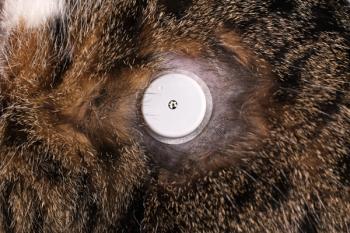
Break through to better diabetes care for your veterinary patients
We asked Dave Bruyette, DVM, DACVIM, how hes using at-home blood glucose monitoring to improve care for diabetic pets, and how he convinces veterinary clients to overcome their fear of needles and injections. Heres what he said.
Why do at-home blood glucose monitoring?
In the past we used to think at-home blood glucose monitoring wouldn't change our clinical approach much, but research has shown that in fact it's quite valuable to managing these cases. One key reason is
that it eliminates the inherent variability that's caused by patients coming into the clinic. Bringing a dog or cat into the clinic artificially raises their blood sugar concentrations because of stress. Eliminating that gives us a much more accurate picture.
And, of course, day-to-day blood glucose variations occur. Household routines such as typical feeding and insulin administration times make a difference, and at-home motoring gives you the most accurate view of what's really going on inside the pet.
Finally, newer intensive insulin protocols that you use to try to get the diabetes to go into remission in a cat almost always require the use of at-home blood glucose monitoring. In these cases, the pet owner will make dosage adjustments based on the glucose readings.
How do you get clients to agree?
Clearly, some pet owners hesitate about at-home monitoring. They're afraid they can't use the machine, they don't understand how they'll transmit the data to your practice, and they don't think they can get the blood samples. Training is key. You have to convince clients they can do it. The companies that make the machines provide good video training that you can use to make clients more comfortable. And a technician who's good at training can be a real asset in helping clients learn what they need to know.
We also talk to clients about this being a less expensive route for treating the diabetes. If they can monitor the glucose at home, especially in a cat, and get the diabetes to go into remission, it's far cheaper to do an intensive protocol up front than to bear the expense of managing a diabetic cat for years. When clients understand that we're really trying to get their cat to go into remission, it's usually much easier to convince them that they can take on the at-home monitoring.
Doesn't at-home monitoring lead to decreased office visits?
We encourage clients with diabetic pets to come to the clinic three or four times a year, and we don't see that at-home monitoring decreases the number of times we see them. In fact, we've seen that at-home monitoring can lead to more visits, not fewer. That may be partly because it selects for a more motivated pet owner. And there are times when you may call the client and schedule the appointment when you see something unusual in the data that you can't manage over the phone or by email.
So, about all those calls and emails ... Do you charge for that time?
No, but we do steer clients to emails rather than phone calls. Emails take less time for our team to manage, are often more focused and give you written documentation of your exchanges. And you obviously have a lot more flexibility about when you respond, compared with phone calls. Very few of our clients abuse our no-charge-for-email policy, and if we did see a problem, we could come up with a remedy for those particular situations.
Newsletter
From exam room tips to practice management insights, get trusted veterinary news delivered straight to your inbox—subscribe to dvm360.




